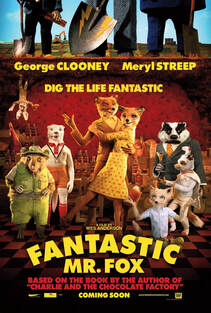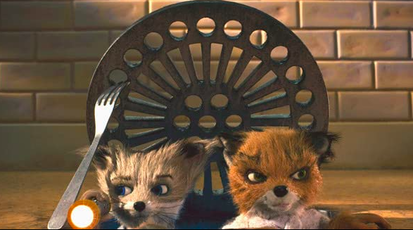
Please note: The following text contains spoilers. Viewer discretion is also advised – this film is rated ‘PG’. For more details on the film’s content, read Focus On The Family’s Plugged In review.
Mrs. Fox: “Twelve fox-years ago you made a promise to me . . . you would never steal another chicken . . . and I believed you. Why? Why did you lie to me?”
Mr. Fox: “Because I’m a wild animal."
At a lean 87 minutes, Wes Anderson’s stop motion animation Fantastic Mr. Fox (a loose adaptation of the Roald Dahl classic), manages to pull off a rare cinematic feat: offer perceptive and mature reflections upon human nature, which are framed within a ‘children’s film’ concerning mischievous woodland creatures. On paper then, Anderson’s film – featuring a heady mix of autumnal colouring, classic American pop and an obsession with symmetrical framing – just shouldn’t work. Is it a film for adults, children or both? In short, it’s a delight to be shared with everyone, but particularly those who are learning of/attempting to control the affections and desires of the “flesh”, which so often run contrary to God’s laws. But what of our anthropomorphic ‘hero’ Mr. Fox? Can or should he, a self-described “wild animal”, ever hope to overcome his animalistic tendencies in order to live a less self-centred life, for the sake of his family? Or must he simply give in to his seemingly harmless desire to place birds between his teeth?
Upon learning that his wife is pregnant with their first cub, Mr. Fox (George Clooney), a lovable rogue with a penchant for chicken thieving, makes a promise to Mrs. Fox (Meryl Streep): he will find himself an alternative, less dangerous form of employment, to ensure his family’s safety. But twelve years later, Mr. Fox’s role as a columnist leaves him feeling unfulfilled, and he misses the excitement and adrenaline brought on by his former career. Not content with living in a foxhole any longer (it makes him “feel poor”), Mr. Fox purchases a literal tree house, much to the behest of his lawyer (Bill Murray), who forewarns him that the farms of Boggis, Bunce, and Bean are in close proximity to his family home. But Mr. Fox isn’t concerned with those powerful, violent and mean-spirited men - he’s far more interested in devising and carrying out plans to rob them blind. And that he does, which his victims naturally do not take kindly, planning a retaliation for the ages. Is Foxie’s crossing over of the line, whilst exhilarating and highly amusing, worthwhile after all?
Fantastic Mr. Fox revels and delights in incorporating tropes of filmmaking into its frivolities. The one which appealed most to me is that of the ‘one last job’ conceit, which has influenced many a filmmaker, from Michael Mann (Heat) to Christopher Nolan (Inception). Here, Mr. Fox decides that he’s going to “secretly do one last big job on the sly”, despite sub-consciously acknowledging the threat it might pose to his family, and his marriage. Whilst his “master plan” is executed without error, leading him to amass an impressive haul, it predictably serves only to enrage the local farmers. So, when the combined workforces of Boggis, Bunce and Bean lead a ridiculous, all-out assault on Fox’s tree house, the crafty fox is forced to not only step into the role of “the quote-unquote fantastic Mr. Fox”, but also confront who he has allowed himself to become.
According to the Bible, Mr. Fox’s misguided actions (and by extension, our own) are not always permissible – even if we feel that we were born a certain way or are doing something for the sake of our own perceived happiness. For whilst anyone can be born with a disposition towards something, and genuinely feel as if that is ‘who they are’, we aren’t always justified in the pursuit of that. For example, what if acting upon such a disposition hurts ourselves, or those we love? The Bible teaches that humanity has ultimately been born with a disposition to sin, even particular mistakes such as theft - made clear in the case of Mr. Fox, who maintains that his nature defines who he is. This is because everyone has been born with a sinful nature, which we ourselves inherited: Sin “…came into the world through one man (Adam), and death came through sin, and so death spread to all because all have sinned…” (Romans 5:12, NRSV). In Psalm 51 (ICB), we even read King David acknowledging this sinful state within himself: “I was brought into this world in sin. In sin my mother gave birth to me.”. From birth onwards, therefore, the Bible teaches that we all become “…people (who) have sinned and are (therefore) not good enough for God’s glory.” (Romans 3:23, ICB).
However, God teaches through His Word the Bible, that we don’t have to conform ourselves to our sinful nature. For by doing so, we will not receive the happiness or satisfaction which we or Mr. Fox seek. Just as in Fantastic Mr. Fox, all that our sin will bring upon us is disaster – both literally and spiritually, both here and in eternity. Rather, we need not act upon our sinful desires, which hurt ourselves and have the potential to hurt those around us. All that we must do, in order to “have life, and have it to the full” (John 10:10, NIV), just as Mr. Fox so desperately seeks, is come to Jesus. For whilst we have done wrong in God’s eyes by living for ourselves, He “has shown us how much he loves us” in sending Christ to die for us, taking the punishment that we deserved, even “while we were still sinners” (Romans 5:8, GNT). Through His perfect sacrifice on the Cross, Jesus has given us the opportunity, “by the Spirit”, for “you put to death your sinful actions”, so that “you will live” (Romans 8:13, GNT) forever in relationship with Him. In Christ alone, even a sinful, ‘wild animal’ such as Mr. Fox can learn to put to death “put to death…the earthly desires at work in” him (Colossians 3:5, GNT), to then truly live the life fantastic.
Challenge:
Why not prayerfully invite a friend or family member who doesn’t yet know Jesus, to watch Fantastic Mr. Fox for themselves? Use the film’s themes to ask them what they thought of the film, if they spotted any links to Christianity and what they might think of the Gospel’s response to this subject.
If you feel able to, ask them what they think about Mr. Fox and his pursuit of happiness – is it just harmless fun, or is it reckless, and perhaps even dangerous? Prompt them to consider the cost of Mr. Fox’s actions too – do they feel that what he accomplished was worth all of that, regardless of the consequences? Later, if they're open to hearing it, take an opportunity to share the hope of the Gospel message with them, mentioning the fact that Mr. Fox’s selfish pursuit of happiness only brought Him pain and anguish. To end, share with them about the complete happiness and fulfilment found in a relationship with Christ.
Prior to watching the film for yourself, however, take a moment to pray that God would speak to you through the film. If you feel comfortable, pray this prayer over all of your future, film-watching experiences:
Dear Lord, as I watch this film, I ask that you would be present here with me. Highlight to me anything within it that is honourable, anything that can be used in conversation for your Kingdom purposes. Amen.
Fantastic Mr. Fox is available to stream on Amazon Prime (UK).



 RSS Feed
RSS Feed